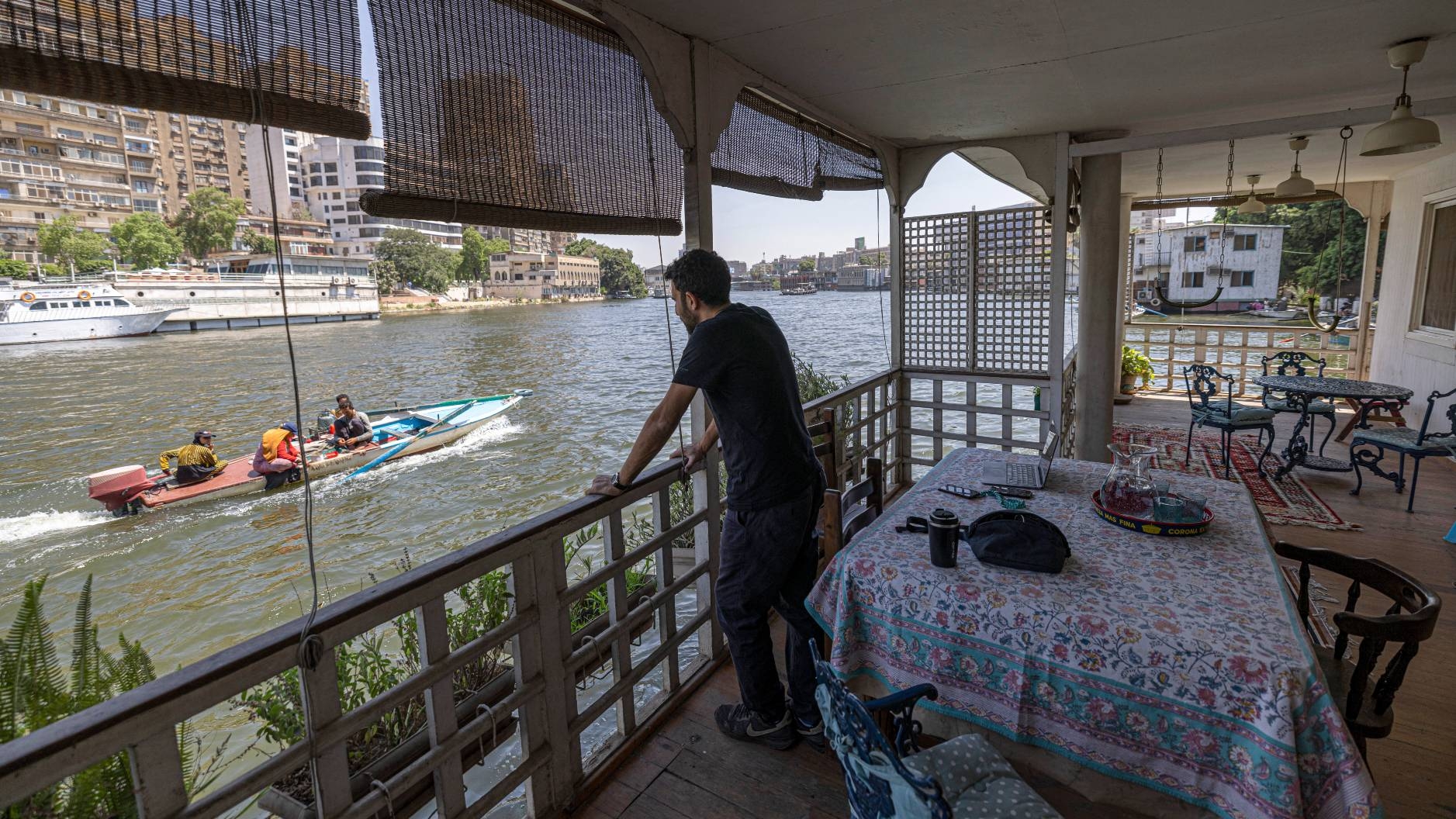Egypt: Authorities remove all of Cairo's iconic Nile houseboats

Egyptian authorities have completed the removal of an entire community of houseboats in Cairo, which floated near the Nile banks, as an official Monday deadline came into effect.
Since last month, Egyptian officials from the Central Administration for the Protection of the River Nile and the river police had started removing 32 houseboats in the Kit Kat area of the Giza neighbourhood of the capital.
'I'm like a fish in the sea, if I get out from here, I'll die. I sold everything I own to buy this houseboat'
- Ekhlas Helmy, houseboat resident
Some residents had lived in their houseboats for dozens of years, tending their front gardens and seeing their children and grandchildren grow up on the river.
The 32 houseboats sat on a narrow section of the Nile bank, that stretched nearly one kilometre up to the Imbaba Bridge.
Stay informed with MEE's newsletters
Sign up to get the latest alerts, insights and analysis, starting with Turkey Unpacked
Manar, an architect, and her mother Nahed used to live in houseboat number 39.
Manar told Middle East Eye that her father, a war veteran who fought in the 1973 war against Israel, had invested his army end-of-service compensation and sold two flats to buy the houseboat in 2017.
"I've packed up all of our stuff four months ago. I always dreamed of living in a houseboat when I was a kid, when we used to go fishing in the Nile, but my dream had turned into a nightmare," she said.
"I think it will be the last day of my life when I get out of my house boat."
'Displacement'
Egyptian authorities had told the residents to obtain a commercial permit, normally purchased by restaurants and cafes, to keep the houseboat in its place, but they had refused.
Ahdaf Soueif, an Egyptian-British novelist who lives in houseboat number 53, told MEE that the authorities had cut their water and electricity in recent days, describing the removal orders as "displacement decisions".
"My houseboat is a private ownership. I pay the government for a navigation licence and protection on the Nile every year. We live here and these are our houses," she said.
On Monday, Soueif's houseboat was removed along with the remaining houses. She tweeted a picture of her front garden, where she planted an olive tree to remind her of her trips to Palestine.
Ekhlas Helmy, the oldest resident living in the houseboats, told MEE that she was born in a houseboat and has lived all of her life there.
"I'm like a fish in the sea, if I get out from here, I'll die. I sold everything I own to buy this houseboat. I'm 88 years-old and I wanted to finish my life in this houseboat," she said.
A once thriving community
On Monday morning, a last-minute meeting between residents and officials at the Ministry of Justice did not resolve the issue of removing the houseboats. However, some residents may store their houseboats until authorities allow them to move to another location on the Nile river.
Egyptian houseboats were once a thriving community on the Nile, where society's elite lived.
Before the 1960s, almost 600 houseboats were floating near the upmarket area of Zamalek, homes to writers, musicians, media figures, British and German spies and politicians.
However, Egyptians began to abandon the houseboats after the government decided in the 1960s to move them north of the river close to Imbaba, one of Cairo's working-class neighbourhoods.
Egyptian authorities said that removing the houseboats is part of a plan to develop the Nile corniche and create river walkways.
Ayman Anwar, the director of the Central Administration for the Protection of the River Nile, told local media that the plan is to restore "the civilised scenery of the Nile River, in the Cairo and Giza areas, which are considered tourist attractions".
"These houseboats are damaging the civilised scenery. They don't have permits to dock in the Nile, and they will be removed...while the tourist houseboats will remain in place," Anwar said.
This article is available in French on Middle East Eye French edition.
Middle East Eye delivers independent and unrivalled coverage and analysis of the Middle East, North Africa and beyond. To learn more about republishing this content and the associated fees, please fill out this form. More about MEE can be found here.




